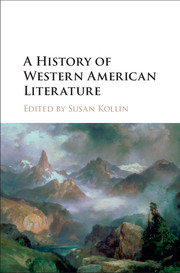Book contents
- Frontmatter
- Contents
- Notes on Contributors
- Acknowledgments
- Introduction: Historicizing the American Literary West
- PART I HOMELANDS
- PART II MAKING A REGION
- PART III GEOGRAPHIES OF THE LITERARY WEST
- PART IV THE TWENTIETH CENTURY AND BEYOND: LITERARY MOVEMENTS AND CRITICAL PERSPECTIVES
- 14 Early Cinematic Westerns
- 15 The Environmental Novel of the American West
- 16 Hard-Boiled Fiction and Noir Narratives
- 17 The Beats and the American West
- 18 Contested Wests: Indigenous Americans and the Literature of Sovereignty
- 19 Asian American Writers and the Making of the Western U.S. Landscape
- 20 African American Literature: Recasting Region through Race
- 21 Hollywood Westerns: 1930s to the Present
- 22 Urban New Wests
- 23 Queer Frontiers: Gender and Sexuality in the American West
- 24 Postwestern Literature and Criticism
- Selected Bibliography
- Index
17 - The Beats and the American West
from PART IV - THE TWENTIETH CENTURY AND BEYOND: LITERARY MOVEMENTS AND CRITICAL PERSPECTIVES
Published online by Cambridge University Press: 05 November 2015
- Frontmatter
- Contents
- Notes on Contributors
- Acknowledgments
- Introduction: Historicizing the American Literary West
- PART I HOMELANDS
- PART II MAKING A REGION
- PART III GEOGRAPHIES OF THE LITERARY WEST
- PART IV THE TWENTIETH CENTURY AND BEYOND: LITERARY MOVEMENTS AND CRITICAL PERSPECTIVES
- 14 Early Cinematic Westerns
- 15 The Environmental Novel of the American West
- 16 Hard-Boiled Fiction and Noir Narratives
- 17 The Beats and the American West
- 18 Contested Wests: Indigenous Americans and the Literature of Sovereignty
- 19 Asian American Writers and the Making of the Western U.S. Landscape
- 20 African American Literature: Recasting Region through Race
- 21 Hollywood Westerns: 1930s to the Present
- 22 Urban New Wests
- 23 Queer Frontiers: Gender and Sexuality in the American West
- 24 Postwestern Literature and Criticism
- Selected Bibliography
- Index
Summary
The Beat generation – a small literary coterie whose principal members include Jack Kerouac, Allen Ginsberg, and William Burroughs – is conventionally defined by its origins, or the shared spaces and experiences that initially drew the group together: a desire to write, aborted studies at Columbia University, Times Square's drug and hustler culture, some petty criminality, and occasional stints at local psychiatric hospitals. Located thus, the Beat generation is routinely regarded as a prototype of post–World War II America's emergent counterculture.
And yet this origin narrative often obscures as much as it reveals about the larger significance of Beat culture. For the Beat ethos relies less upon its singular genesis than on its multiple exoduses, or the Beats’ constant taking to the road, their nonchalant (even eager) exchanging of roots for routes, and their copious unpredictable departures, far-flung voyages, and heterogeneous lines of flight – from Denver, San Francisco, and New Orleans to Mexico City, Tangiers, Prague, and beyond. Consequently, the very term “Beat generation” is practically a misnomer, mistakenly reifying what is better understood as a Beat diaspora. After all, Beat culture was little more than embryonic and even largely made up of mere juvenilia, until after the Beats hit the road, headed west, and then anointed Neal Cassady, the “western kinsman of the son,” as its primary muse, making the Beat movement not only a diasporic movement but one traveling in an explicitly westward direction. The Beats may have been conceived in the East, but Beat culture was born, like Cassady himself, in a jalopy traveling west. For absent Cassady's explicitly western “wild yea-saying” it is not even clear that the Beat movement would have ever taken anything remotely resembling the form that it eventually did. Cassady, his westernness, and the literal physical western journeys that he inspired – arguably more, even much more, than post–World War II New York City – was the prime mover and the sine qua non of Beat culture at large.
- Type
- Chapter
- Information
- A History of Western American Literature , pp. 270 - 281Publisher: Cambridge University PressPrint publication year: 2015

